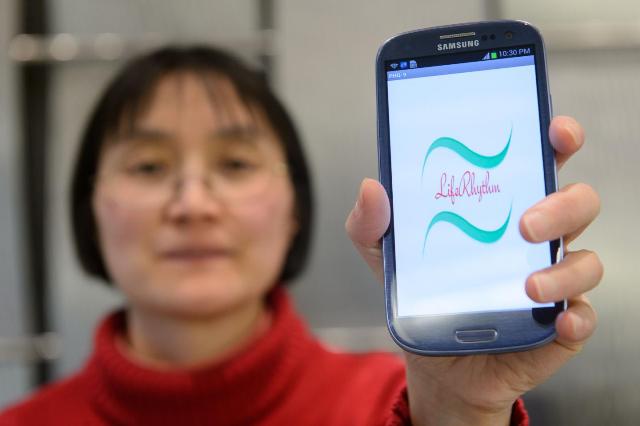Mar 31 2015
It's common to hear complaints about our near-constant connection to our smart phones, but University of Connecticut researchers believe the ubiquity of these devices could lead to better screening for depression.
 UConn Associate Professor Bing Wang holds a smartphone with an application created to help monitor people with depression. Credit: (Peter Morenus/UConn Photo)
UConn Associate Professor Bing Wang holds a smartphone with an application created to help monitor people with depression. Credit: (Peter Morenus/UConn Photo)
A new mobile phone app, LifeRhythm, is designed to detect the symptoms of depression by gathering data from various sensors on the phone - GPS, accelerometers, and microphones among them - that can pick up on behaviors such as activity, energy levels, and social interactions. The app then takes this information to screen for the depression in the user. Bing Wang, associate professor of Computer Science & Engineering at UConn, led the research team that developed the app. The project is funded with a $718,815 grant from the National Science Foundation Directorate for Computer and Information Sciences and Engineering.
Wang said the smart phone is a perfect tool for depression screening. GPS, for instance, gives us information about how often and how far people venture outside their homes. Sound sensors pick up on certain features of the user's speech; simple acoustic features such as tone, the duration of pauses and loudness are useful for detecting depression. Accelerometers and gyro sensors provide hints on the physiological activities and energy level of a user. The number of phone calls and SMS messages that a user initiates and receives indicate his/her interest in interacting with other people.
If the technology of LifeRhythm were widely adopted, it would revolutionize how depression is diagnosed. Because there are no direct biomarkers to diagnose depression in common clinical practice, various interview-based methods have been developed to screen for depression. The most commonly used test is the Patient Health Questionnaire-9 (PHQ-9), which was developed in 1999. The nine criteria it screens for are anhedonia (inability to experience pleasure), depressed mood, trouble sleeping, fatigue, change in appetite, feelings of guilt or worthlessness, trouble concentrating, feeling slowed down or restless, and suicidal thoughts.
Wang, who has been with UConn's School of Engineering since 2005, said these questionnaires are considered reliable screening tests but they have their shortcomings. For one, it takes time to fill them out on a regular basis - and those suffering from depression may not want to take that time. In addition, patients have to rely on their memory to fill in the questionnaires, or their answers may be biased toward what they think clinicians want to see. Another drawback is that there is a shortage of clinicians trained to specifically administer and interpret the questionnaires. By contrast, the LifeRhythm app collects the data automatically, and the information is objective.
They hope to recruit 120 student subjects for the first phase of the study, which will last for one semester. Half of the group would have a prior history or current symptoms of depression and the other half would not. For the second phase, they plan to recruit 300 students. During this phase, the researchers will refine the data collection process.
"We will only focus on students living on campus," Wang said. "College students are more likely than others to be depressed - they're very young, away from home for the first time, and there's all kinds of stress."
Wang says the study could be the first step in dealing with depression in mass populations, and help mental health workers identify depression promptly. It could also contribute significantly to public health by raising awareness about depression. In the future, she said, the technology could be enhanced to take a more active role in treating patients with various intervention techniques.
"The intervention could be as simple as a text saying 'go out for a walk,'" she said. "Intervention would be a very natural next step."